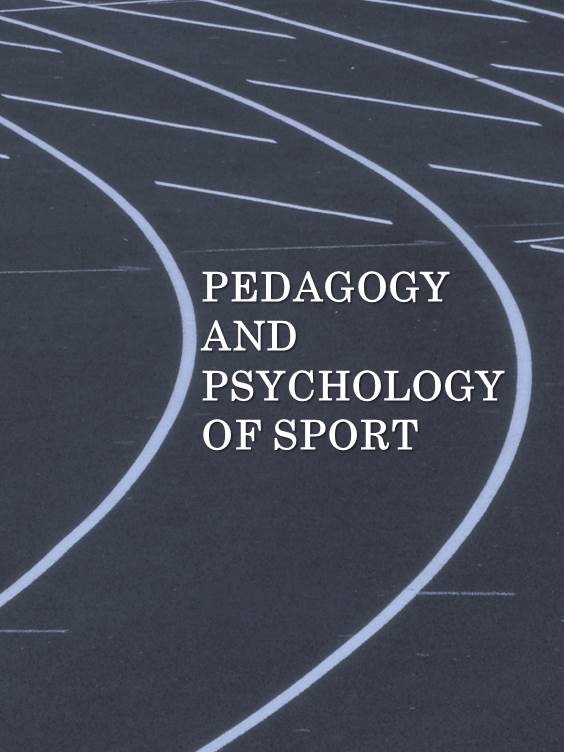Relationship between psychological state and performance of rowers aged 14-16
DOI:
https://doi.org/10.12775/PPS.2025.22.61143Keywords
rowing, psychological state, double periodization, preparation, block approachAbstract
Introduction. Kayaking and canoeing requires a significant level of psychological resilience and physical fitness from athletes, in the face of ever-increasing levels of competition and the number of events throughout the season.
The aim of the study was to determine the relationship between the rowing performance dynamics and the psychological state dynamics in rowers aged 14-16 years after a year of training using a block approach with double periodization.
Materials and Methods. 22 rowers aged 14-16 took part in the study.
Results. The study found an improvement in rowing time at a distance of 500 m by 9.32% (p<0.001) and 1000 m - by 7.75% (p<0.001) after a year of training with a block approach and double periodization. According to the results of the Sport Orientation Questionnaire: the competitiveness indicator improved by 14.29%, the desire to win indicator improved by 17.01%, and the purposefulness indicator improved by 16.69% (p<0.001). In addition, a significant correlation was found between the improvement of the result at the distance of 500 m and the improvement of competitiveness (r = 0.559, p˂0.01), desire to win (r = 0.624, p˂0.05) and purposefulness (r = 0.548, p˂0.01) and between the improvement of the rowing time at the distance of 1000 m with the improvement of desire to win (r = 0.517, p˂ 0.05) and purposefulness (r = 0.616, p˂ 0.01), with the improvement of competitiveness indicator the correlation was moderate (r = 0.473, p < 0.05).
Conclusions. Therefore, the block approach with double periodization is effective and well-thought-out regarding the alternation of periods of intense loads and rest, thanks to which the exhaustion of athletes' bodies is prevented and their psychological state improves too.
References
Bafirman, B., Hidayat, R. A., Sabillah, M. I., Rahman, D., Zarya, F., Ockta, Y. (2024). The role of sport psychology in improving the performance of badminton athletes, a systematic review. Retos: Nuevas Tendencias en Educacion Fisica, Deporte y Recreacion, 61, 1126-1137.
Bell, A. F., Knight, C. J., Lovett, V. E., & Shearer, C. (2020). Understanding elite youth athletes’ knowledge and perceptions of sport psychology. Journal of Applied Sport Psychology, 34(1), 155–177. https://doi.org/10.1080/10413200.2020.1719556
Bohuslavska, V., Furman, Y., Pityn, M., Galan, Y., & Nakonechnyi, I. (2017). Improvement of the physical preparedness of canoe oarsmen by applying different modes of training loads. Journal of Physical Education and Sport, 17(2), 797-803. https://doi:10.7752/jpes.2017.02121
Bompa Т, Buzzichelli С. (2018). Periodization-6th Edition: Theory and Methodology of Training (6th ed.). Human Kinetics.
Coppel, D. B. (2020). Sport psychology and performance psychology: Contributions to the mental health of athletes. In Mental Health in the Athlete: Modern Perspectives and Novel Challenges for the Sports Medicine Provider. Springer International Publishing. https://doi.org/10.1007/978-3-030-44754-0_21
Duda, J.L. (1992). Motivation in sport settings: A goal perspective approach. In G.C. Roberts (Ed.), Motivation in sport and exercise, 57-91.
Frank W. Dick. (2015). Sports Training Principles An Introduction to Sports Science (6th ed.). Bloomsbury Sport.
Frank W. Dick. (2007). Sports Training Principles (5 th ed.). A&C Black.
Fajar C., Wicaksono D., Andareza A. (2025). Achievement motivation in gymnastics athletes based on the Achievement Motivations Scale for Sports Environments: a study of gender differences. Fizjoterapia Polska, 25(1), 247-254 https://doi.org/10.56984/8ZG007DG9B8
Gill, D.L. & T.E. Deeter. (1988). Development of the sport orientation questionnaire. Research Quarterly, 59, 191-202.
Gill, D.L., Williams, L., Dowd, D.A., Beaudoin, C.M. & Martin, J.J. (1996). Competitive orientations and motives of adult sport and exercise participants. Journal of Sport Behavior, 19, 307-318.
Hopkins WG, Hawley JA, & Burke LM. (1999). Design and analysis of research on sport performance enhancement. Med Sci Sports Exerc, 31(3), 472-85. https://doi: 10.1097/00005768-199903000-00018
Hu, C. , Kojima, A. , Athenstaedt, U. & Kato, Y. (2017) Psychometric Validation of Exercise Motivation for Health Scale (EMHS). Open Journal of Social Sciences, 5, 274-287. https://doi.org/10.4236/jss.2017.510024.
Klockare, E., Olsson, L. F., Gustafsson, H., Lundqvist, C., & Hill, A. P. (2022). Sport Psychology Consultants’ Views on Working With Perfectionistic Elite Athletes. The Sport Psychologist, 36(3), 219-227. https://doi.org/10.1123/tsp.2021-0055
Michael, J. S., Rooney, K. B., & Smith, R. (2008). The metabolic demands of kayaking: a review. Journal of sports science & medicine, 7(1), 1–7.
Murata, A., McGuire, C. S., Robertson, M., KurtzFavero, M., Coletti, J. T., Simpson, P. B. et al. (2025). Girls, Women, and Female Athletes in Sport Psychology: A Decade-Long Review of the Literature. Women in Sport and Physical Activity Journal, 32(1).https://doi.org/10.1123/wspaj.2023-0022
Park I, Jeon J. (2023) Psychological Skills Training for Athletes in Sports. Web of Science Bibliometric Analysis, 11(2), 259. doi: 10.3390/healthcare11020259.
Platonov V. M. (2021). A modern system of sports training (Suchasna systema sportyvnoho trenuvannia). First Printing House (Persha drukarnia). [in Ukrainian].
Stam, F., Kouzinou, S., Visscher, C., & Elferink-Gemser, M. T. (2020). The value of metacognitive skills and intrinsic motivation for current and future sport performance level in talented youth athletes. Psychology, 11(2), 326–339. https:// doi.org/10.4236/psych.2020.112021
Yang P, Xu R, Le Y. (2024). Factors influencing sports performance: A multi-dimensional analysis of coaching quality, athlete well-being, training intensity, and nutrition with self-efficacy mediation and cultural values moderation. Heliyon, 10(17). https://doi: 10.1016/j.heliyon.2024.e36646.
Downloads
Published
How to Cite
Issue
Section
License
Copyright (c) 2025 Petro Ladyka, Yurii Redkva

This work is licensed under a Creative Commons Attribution-NonCommercial-ShareAlike 4.0 International License.
The periodical offers access to content in the Open Access system under the Creative Commons Attribution-NonCommercial-ShareAlike 4.0
Stats
Number of views and downloads: 390
Number of citations: 0



